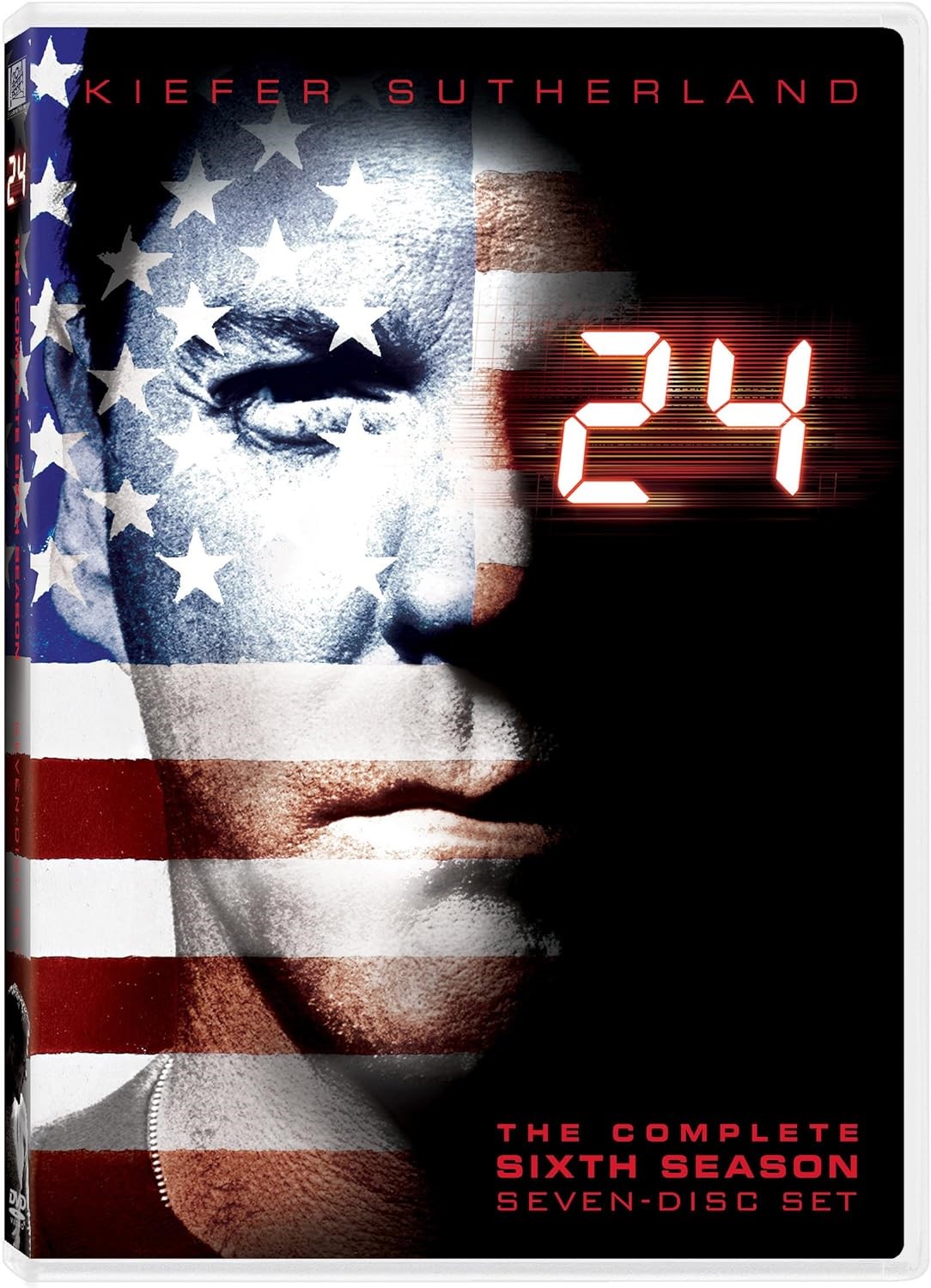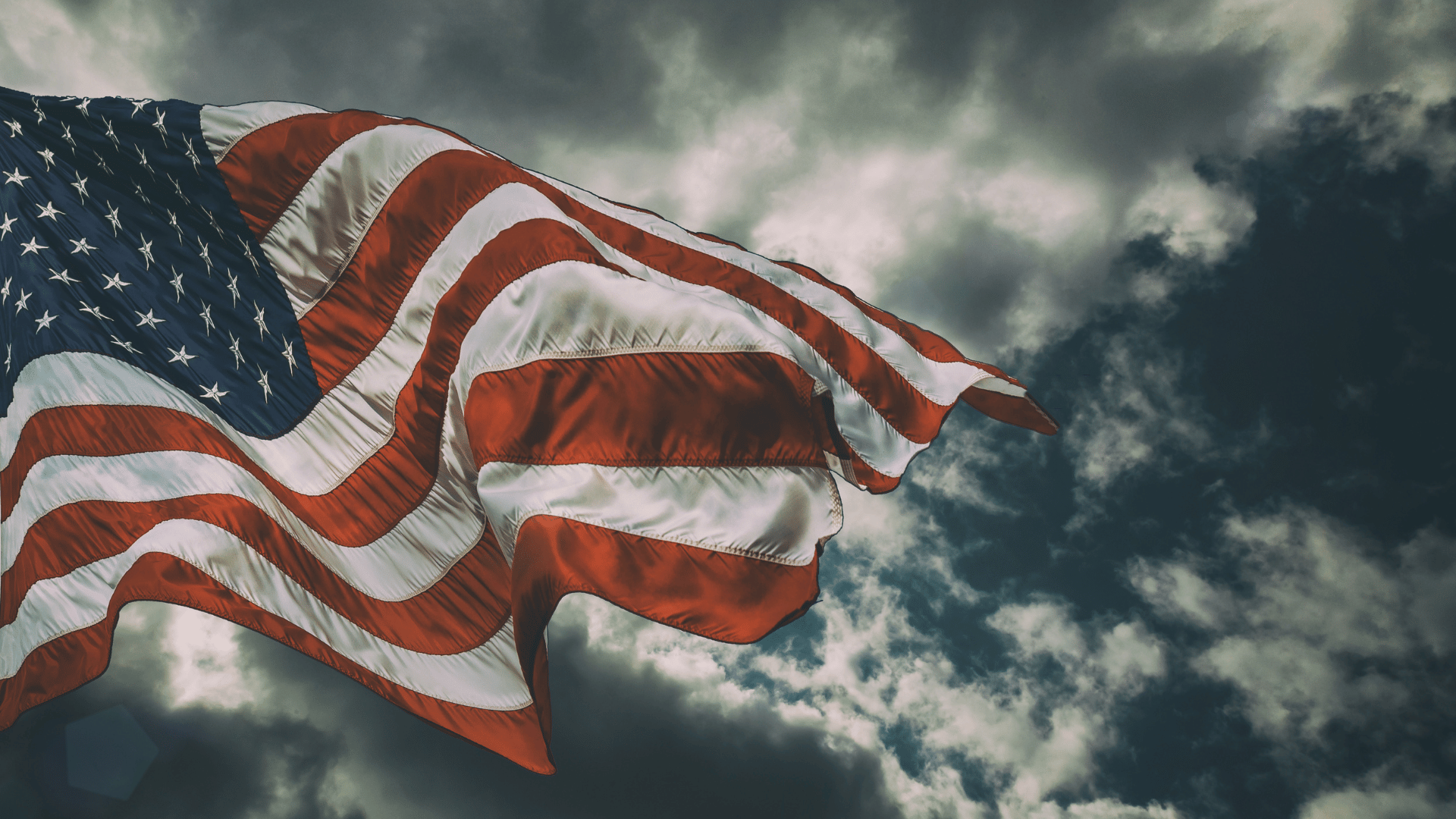‘Damn it! We’re running out of time!’
This is a classic phrase.
Whenever you hear it, you can be sure of one thing: federal agent Jack Bauer is having a very bad day. A terrorist attack is about to happen. And Jack is going to have to use extreme measures to resolve this extreme situation.
Beep. Beep. Beep…
The digital clock ticks down ominously.
The tension escalates.
Your eyes is glued to the screen, your heart pounding, your mouth going dry.
What is at stake here?
Why, the safety of thousands — if not millions — of American lives.
Indeed, time is running out.
A hard-hitting drama with emotional resonance

Source: Amazon
24 first made its television debut in November 2001. A mere two months after the tragedy of 9/11:
- This was a coincidence, totally unplanned. But the show’s appearance at such a critical turning point in our history was profound. It immediately catapulted 24 into the spotlight. The show grabbed public attention, becoming one of the most controversial dramas ever.
- Each season ran for twenty-four episodes. And each episode covered twenty-four hours. It all happened in real-time. The innovative use of split screens and a ticking clock created hypnotic urgency.
In this way, 24 was not just a show. It was a cultural phenomenon. It perfectly captured the dark mood of the War on Terror:
- Every week, as Americans grappled with the moral ambiguity of Afghanistan, Iraq, and Guantanamo, they found comfort by tuning into 24 — a TV show that seemed to offer moral clarity.
- Fact and fiction ran in parallel, often reinforcing each other. The show blurred the lines between political conversation and political action. It had real emotional resonance.
- Because of this, 24 became the very definition of appointment viewing. It was Peak TV. Everyone was talking about the show. Everyone was following every cliffhanger.
You can credit Joel Surnow for all this. He was the creator of 24. A television producer who wasn’t afraid to wear his Republican beliefs on his sleeve:
- Because of this, the show had a conservative outlook. The hero, Jack Bauer, was an uncompromising patriot. He was laser-focused. Willing to do whatever it took to protect America.
- This placed Jack on a collision course with a variety of villains: Serbian radicals, Muslim terrorists, Russian ultranationalists, Chinese spymasters, even American deep-state bureaucrats.
- Sometimes Jack had to stop an assassination plot from being carried out. Sometimes Jack had to stop weapons of mass destruction from being unleashed. Consistently, as time was running out, Jack would always face an obstacle. That obstacle was a character who had critical information — but that character was stubborn and refusing to talk.
- So…given the deadline…what to do? Well, Jack never hesitated. The quickest solution was always the simplest: Jack had to extract information through torture. Indeed, this was his go-to strategy in the race against the clock.
- Here’s a classic quote: ‘If you don’t tell me what I want to know, then it’ll just be a question of how much you want it to hurt.’
- Strangulations. Stabbings. Bone-breakings. Electrical shocks. It felt like no act was ever too extreme for Jack to carry out. Even if his superiors disapproved of his methods and tried to hold him back, Jack refused to compromise. He was convinced that he was right — and more often than not, he was.
- There was an emotional catharsis in the way that Jack didn’t care about wokeness or human rights. He simply went ahead and pulled the trigger. Again and again. ‘Whatever it takes’ was the overriding philosophy of 24.
An agonising debate about ethics
Source: Image generated by OpenAI’s DALL-E
Now, more than any other show I’ve seen, 24 has done the most to influence our perception of the ticking time-bomb scenario:
- If the threat is immediate, can torture be justified? Can civil liberties be sacrificed on the altar of national security? How far is too far when it comes to getting actionable intelligence?
- These are legitimate questions which have sparked fierce debate. About morality. About legality. About necessity.
Supreme Court Justice Antonin Scalia was a fan of 24. It lined up perfectly with his conservative beliefs:
‘Jack Bauer saved Los Angeles. He saved hundreds of thousands of lives. Are you going to convict Jack Bauer? Say that criminal law is against him? “You have the right to a jury trial?” Is any jury going to convict Jack Bauer? I don’t think so.’
Meanwhile, former US president Bill Clinton was also a fan of 24, even though he felt that the show’s portrayal of violence conflicted with his liberal beliefs. He said that torture should never be legitimised on the institutional level, but there was room for individual choice:
‘If you look at the show, every time they get the president to approve something, the president gets in trouble, the country gets in trouble. And when Bauer goes out there on his own and is prepared to live with the consequences, it always seems to work better.’
However, former FBI agent Joe Navarro was a fierce critic of 24. He pushed back against the way the show made torture sexy and seductive:
‘Only a psychopath can torture and be unaffected. You don’t want people like that in your organization. They are untrustworthy, and tend to have grotesque other problems.
‘None of it works. I’ve done thousands of interviews, and I can tell you, none of [the TV torture stuff] works.
‘A human being isn’t a light switch. We don’t really know when someone will go into shock or when they will faint or even die.’
Former US Army Brigadier General Patrick Finnegan was also troubled by 24’s portrayal of torture. He was worried that young soldiers might imitate Jack Bauer’s exploits. So Finnegan specifically met with the show’s producers, asking them to tone down the violence:
‘The kids see it, and say, “If torture is wrong, what about 24?” The disturbing thing is that although torture may cause Jack Bauer some angst, it is always the patriotic thing to do.’
So…ultimately…this raises the question:
- Has 24 normalised the breaking of the American Constitution, which is corrosive to the soul of democracy?
- Or is 24 just harmless entertainment, providing emotional catharsis?
Provocative. Suspenseful. Agonising. The legacy of 24 is clear:
- This was more than just a television drama. This was a watershed moment. Leaving a deep and enduring mark on our cultural landscape. Forcing us to confront the twilight zone that exists between public safety and personal liberty.
- From the War on Terror to the War on Covid, the ethics of power is something that we all wrestle with. How much freedom are we willing to give up to feel safe? And how many laws should we break in order to get things done?
Jack Bauer himself had a moment of sober reflection. He expressed his conflicted feelings about all the civil liberties he’s had to violate in the name of the greater good:
‘I’ve been wrestling with this my whole life. I see 15 people held hostage on a bus, and everything else goes out the window. I will do whatever it takes to save them — and I mean whatever it takes.
‘When you cross that line, it always starts with a small step. Before you know it, you’re running as fast as you can in the wrong direction, just to justify what you started in the first place.
‘These laws were written by much smarter men than me. And in the end, I know that these laws have to be more important than the 15 people on the bus. I know that’s right. In my mind, I know that’s right. I just don’t think my heart could ever have lived with that.’
The real-world impact
Source: Image generated by OpenAI’s DALL-E
Of course, 24 may have ended its television run years ago. But to this day, loyal fans are still clamouring for Jack Bauer to return:
- It’s not hard to understand why. There’s enormous appeal in a renegade hero who’s willing to take extreme measures to achieve results. It speaks to our desire for wish-fulfilment, doesn’t it?
- After all, we live in a world that often feels paralysed by debate and indecision. So Jack’s brute-force approach to cutting through the noise, even at great personal cost, feels incredibly attractive. It does tap into our universal longing for clarity in an increasingly complicated world, doesn’t it?
- So, if you’re wondering why people support political leaders like Jair Bolsonaro, Javier Milei, or even Donald Trump, well, you have your answer right there.
- Toughness — uncompromising, unyielding, abrasive — stirs the public imagination more than anything else. People love someone who cuts through the bureaucracy, even if they do end up breaking a few bones along the way.
It’s time to have your say
I hope that you’ve enjoyed reading our articles as much as we’ve enjoyed writing them:
- Your prosperity is our focus — which is why we are always working hard to uncover new opportunities beyond the radar for you.
By the way, I have a small favour to ask:
- Would you like to write a review of our work here at Wealth Morning?
- Do you want to let us know if our stories have inspired you in a positive way?
- Do you want to let us know if our stories have helped you become a more successful investor?
We truly value your feedback It encourages us. It helps us to do better. It helps us to reach further:
- So, if you’d like to leave us a review, it’s quick and easy. It will only take two minutes of your time.
- Thank you so much in advance for your kindness and generosity. Your readership keeps us going!
Regards,
John Ling
Analyst, Wealth Morning

